#i think its cause charles vi is just not that relevant but is relevant to me so to have this paper abt his personal relationships is very !
Text
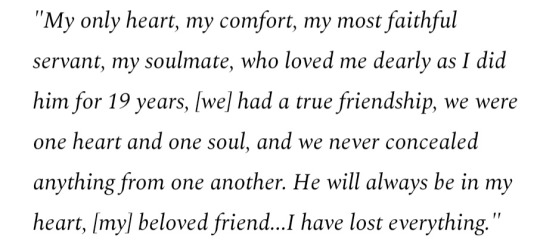
— Emperor Charles VI's diary entry on Count Althann's death
[text: "My only heart, my comfort, my most faithful servant, my soulmate, who loved me dearly as I did him for 19 years, [we] had a true friendship, we were one heart and one soul, and we never concealed anything from one another. He will always be in my heart, [my] beloved friend..I. have lost everything."]
#this is like. incredibly niche.#but also hopefully a quote one can look at without context and still feel emotional damage about#idk. i think about this quote probably at least once a week and then have to stare at it and cry a bit#its just GOD. yknow??????#theres this one paper(which i linked) that i originally read as research for the AU#but i go back to it probably twice a month to reread it bcs im so !!!! abt it#i think its cause charles vi is just not that relevant but is relevant to me so to have this paper abt his personal relationships is very !#its both nice as ref for the au but also very interesting to hear about historical queer relationships/dynamics#the sections about him and his wife are very endearing as well#but god like him and count althann. im literally so invested in this 300 year old relationship#this is obviously from his death which is incredibly depressing and heart wrenching to me#but the other things he wrote about althann in his diary are very sweet to me#they were inseparable to the point of often sleeping in the same bed and charles called him his 'eternal love'#AND ON ALTHANN'S DE WIKIPEDIA PAGE IT LITERALLY CALLS HIM THE EMPEROR'S FAVORITE#anyways literally every part of this quote absolutely destroys me but especially how he refers to althann and then the ending#and its interesting to me bcs apparently his diary entries were usually pretty to the point#but when various people in his as althann died he would write these extremely emotional entries that are so </3#if you have any questions abt their dynamic pls i will talk abt them 🥰🥰 i find it fascinating#theres a book about his diary but its in german and 500 pages and kinda hard to get hold in but maybe one day!!!#also in AU contexts: althann and charles vi would be mark and seb so take that as you will 🤭😭#as i said this is great for ref but also made me sooooo fucking invested in him#i have no idea how to tag this#historical#holy roman empire#emperor charles vi#catie.rambling.txt#historical quotes#habsburg#habsburg monarchy#ah wow if only my german prof could see me now. fucking...habsburg posting. why am i like this
20 notes
·
View notes
Text
Orphans of the Storm: Attachment, Trauma and the Developmental Trajectories of Lelouch and Nunnally in Code Geass
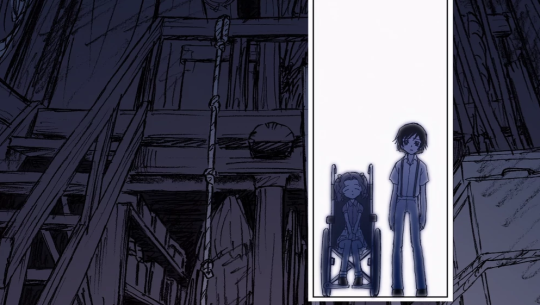
Alternatively titled, Matt Has a Lot of Thoughts About the Lamperouges. 7000+ words of thoughts, to be exact. Some of them might even be semi-intelligent. Admittedly, much of this was written from a hospital office while procrastinating writing patient journals for actual patients who are real humans and not fictional characters. Thank you to my supervisor for not supervising me very much.
I. Introduction
First, let us first briefly set the stage. The story of Code Geass is set in an alternate universe where the social-darwinist, imperialist superpower The Holy Britannian Empire is ruling large parts of the world. Lelouch and Nunnally vi Britannia are born into the royal family as children of 98th Emperor Charles zi Britannia and one of his consorts, Marianne. After their mother is assassinated in a terrorist attack at the Imperial Palace, an incident which leaves Nunnally blind and paralysed from the waist down, the two are sent to Japan as political hostages. The Britannian Empire then invades Japan shortly after they arrive, and they must seek refuge with the Ashfords, a wealthy family with ties to their mother Marianne. Presumed dead by the rest of the royal family, they take on the surname Lamperouge and begin to live in hiding in the now-colonised Japan, renamed Area 11.
These events constitute what is to become Lelouch’s raison d’être through the entire series - finding out who assassinated his mother, and creating a safer, kinder environment for his sister to grow up in. Nunnally is an extremely, and I cannot stress this enough, extremely important figure for Lelouch through the entire series (to the point where it’s kind of a joke in most spin-off material). He’s her main caregiver along with their maid Sayako, and protecting her is his primary goal - often at the expense of his own safety, his friends’ safety, and/or massive collateral damage. In this essay, I will analyse their relationship with their parents and each other through the lens of attachment theory, and discuss how these dynamics shape their developmental trajectories as they grow up. I will focus on two domains of development in particular: (1) emotional regulation and (2) identity. Based on this analysis, I’ll make the argument that Nunnally, despite being the one experiencing the most trauma, ended up more well-adjusted than Lelouch. Furthermore, although the series places much emphasis on how Lelouch is the one protecting Nunnally, he is actually more dependent on his sister than she is on him. I will also discuss how these central themes tie into Lelouch’s goals and political ideology.
II. Ode to My Family: The Fundamentals of Attachment Theory
Attachment theory is a psychological theory originating from the work of John Bowlby, concerning the bond between caregivers and their children. Put simply, Bowlby proposed that children are biologically predisposed to form deep, lasting bonds with their caregivers, and this bond has an important influence on subsequent development. In the attachment relationship, the caregiver functions as both a secure base from which to explore (for example, a child feeling safe when playing knowing a parent is nearby), and safe haven to turn to for emotional support (if they get scared or hurt when playing). Caregivers, on their end, facilitate secure attachment through moderate and appropriate stimulation of the child, warmth, mutually responsive interactions, and other behaviours that promote ‘connectedness’. Especially interesting is a trait called mind-mindedness, which can be described as a caregivers ability to conceptualise their child as an independent person, understand their mental/emotional state and respond appropriately. Important to note about attachment bonds is that they’re not “horizontal” - the caregiver and child aren’t on the same “level” as mutual attachment figures to each other, but the caregiver (as the older, wiser, and more experienced person who is able to provide care) will be a figure that the child can rely on.
A healthy attachment bond has a variety of important functions. It promotes the growth of self-reliance (which promotes independency), increases capacity for emotion regulation, promotes later social competence (such as empathy and mutual relationships), and is important for later identity development. This happens through the acquisition of so-called internal working models, that the child employs through their life. To simplify a bit, think of attachment as the mechanism by which caregivers, through their behaviour, teach children what to expect from the world around them, and what strategies to employ to best cope with it. At its core, it is about seeking security and safety - a form of healthy and adaptive dependence that provides a solid foundation and sense of security from which independence can grow
There are three main classifications of attachment bonds - secure, insecure and disorganised. Securely attached children will develop positive internal working models, where world is a fundamentally safe place, they are loved and worthy of that love. Interactions with the caregivers are frequent, mutual and predictable. For insecure attachment, there are two subcategories: avoidant and ambivalent. Insecure-ambivalent attachment is associated with unpredictable interaction styles, where some interactions between caregiver and child may be warm and mutually responsive, while others are more detached or unpredictable. This leads to frustration and confusion, and an ambivalent relationship. Insecure-avoidant attachment, on the other hand, is typically associated with a non-responsive and uninvolved form of care, or an absent caregiver. In this case, the child may feel rejected and like they cannot rely on anyone. Disorganised attachment simply means there is a lack of any organised form of attachment, but that’s not going to be relevant here so let’s ignore that one.
In summary:
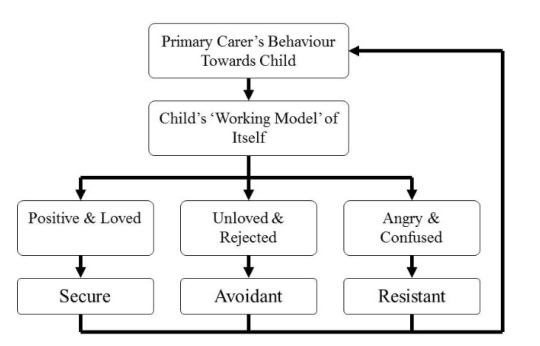
Did you really think you were getting through this one without at least ONE chart? (Note: ambivalent and resistant attachment is the same thing)
Also, important note before moving on from this bit: (1) Attachment is not the be-all end-all for positive/negative developmental outcomes, and (2) I’ll obviously be a bit quicker to assume correlation and draw conclusions than I would in real life, because in my mind applying this stuff to literary analysis vs. applying it to real people are two completely different things. Fiction consists of a series of deliberate choices of storytelling and elements you can easily pick apart and draw lines between (preferably with red string on a corkboard wall, while looking slightly manic), whereas people are, like, more complicated and stuff - nature and nurture and all that.
Now, with attachment theory in mind, let’s have a look at the evil Britannian disaster parents.
III. The Mother We Share: (In)Secure Attachment in the Imperial Palace
Before taking a deep dive into Lelouch and Nunnally’s relationship with one another, it’s essential to discuss their relationships with their parents. Unfortunately for me, there really isn’t much canon material regarding their lives prior to Marianne’s death and the subsequent exile in Japan. However, even with the limited information available, I think it’s fairly safe to say neither Charles nor Marianne deserve a parent-of-the-year award - a point cleverly foreshadowed by me when I referred to them as evil disasters just a few sentences ago.
As for Charles, I hardly need to even make a case that he probably wasn’t a great father. It’s never outright stated in the series, but I’m going to assume they had minimal or no contact with Charles. The main reason behind this is: why would they? He had 108 (!) consorts with whom he had many children, and was busy ruling the largest empire in the world. And as if that wasn’t enough, Lelouch and Nunnally weren’t even particularly high up in in the line of succession and would have been unlikely to ever rule in their lifetime (if it hadn’t been for, er, circumstances). Furthermore, because of his grand plan to fuse humanity into one collective unconscious through the Ragnarök Connection, none of this would matter to him anyway. Additionally, I think his lack of contact with his children is very apparent through the way Lelouch interacts with his father when confronting him about Marianne’s death, which I’ll get back to.
So, we can reasonably conclude Charles was an uninvolved/absent caregiver. However, things get a little more interesting with Marianne.
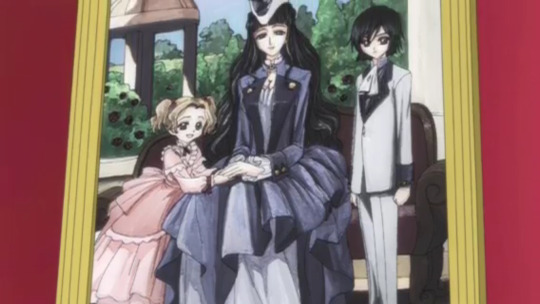
This isn’t relevant to the topic or anything, I just think it’s neat how they made Lelouch so visually similar to his mother. In addition to physical traits, Marianne’s dress here has a really similar structure to what would later become her sons rebellion outfit of choice. She even has a chess-piece-esque hat to go with. Then again, I suppose the alternative was making him visually similar to Charles, and that wouldn’t make for a lot of good fanservice now would it. Anyway, this image description is too long.
As mentioned, avenging his mother’s death is one of the most significant driving forces for Lelouch throughout the series. Her assassination impacted him greatly, both in and of itself and through the harm it caused Nunnally. Whenever she’s brought up, they both seem to get visibly downhearted, and there’s never any indication they remember her anything but fondly. In picture drama 22.25 (from their time as children in the Imperial Palace), the Britannian siblings find a commemorative plate that belongs to her in Euphie’s room. They start to bicker over it, because Nunnally wants to have it herself, while Lelouch thinks Euphie should keep it because it belongs to her. This all indicates that the royal children admired Marianne, and she was obviously an important figure to them both. Through this idolisation, as well as Lelouch’s obsession with what happened at the Imperial Palace, the narrative seems to want us to assume she was a good parent.
However, there are a few things that call into question how reliable of a narrator Lelouch actually is concerning Marianne. Towards the end of the series, it’s revealed that she is actually very much alive, and completely on board with Charles’ Ragnarök plan - making her one of the series’ main antagonists. During Lelouch’s final confrontation with his parents in C’s World in S2 E21, she is unable (or unwilling) to see how faking her death, traumatising her children, shipping them off to a country the Empire promptly invaded without ever making sure they’re still alive, and then trying to convince them to get on board with her human instrumentality plan is wrong. As her wiki bluntly states: “She only superficially loves her children and will not hesitate to kill them if they get in her way.” Taking this information about her character into account, I consider it more likely that the reason Lelouch and Nunnally idolised Marianne was either (1) because they based their impression largely on her reputation, rather than because she genuinely was a loving mother, or (2) she was a very good actor.

At least she provided some strategies to prepare her children for having to cope with the emotional trauma she was about to inflict on them.
How to make sense of their relationship with Marianne from an attachment perspective? I think this is largely up to interpretation due to lack of pre-series material. Lelouch and Nunnally both seem to like and look up to her, but that does not necessarily indicate secure attachment. I would argue they had an insecure relationship with Marianne, and that argument is based on two things. First, her personality traits and actions (rather than Lelouch and Nunnally’s accounts of her): she blatantly uses her children as pawns for her plan, and doesn’t care all that much that they were suffering as a result. Even though she does argue all her planning was well-intentioned, this act quickly fall apart when Lelouch challenges her. As C.C. tells her, “the only people you love are yourselves”. Calling this sort of behaviour “poor mind-mindedness” or “lack of parental warmth” is an understatement - I simply don’t see a scenario where Marianne would genuinely care.
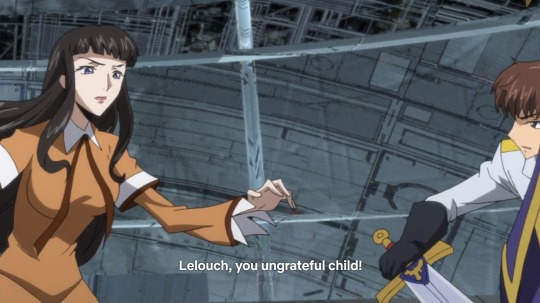
Secondly, I’d argue you can infer it from Lelouch’s patterns of behaviour as he grows older. Many of his actions, and the themes surrounding him as a character, could be seen as a manifestation of insecure attachment - his attitude towards Nunnally, attitude towards his friends in the student council, his emotionality, and the general theme of a fragmented identity, to mention some. But I’m getting ahead of myself. Point is, there is good reason to believe Lelouch or Nunnally had any form of secure attachment bond to either of their parents, and this has some implications for their development as the series goes on.
IV. Abandoned by the Empire: Trauma and Parentification
In addition to not having the best relationships with their parents to begin with, Lelouch and Nunnally were then burdened with more baggage after their mother’s death. In Nunnally’s case, her trauma from the incident was primarily physical (blindness and paralysation of her legs), due to her being literally in Marianne’s arms as she was shot. Lelouch was a witness, and escaped without physical injury. Afterwards, while his sister is still in hospital, he takes it upon himself to confront his father about what happened, and accuses him of having allowed, even facilitated, the assassination through purposefully neglecting security measures that day.
While Nunnally was by all means most harmed by the attack, it is here in the aftermath I’d argue Lelouch takes his “main blow” in the parental trauma department. When confronted, Charles gets angry and tells Lelouch that everything in his life has been handed to him by virtue of being a child of the royal family, and thus he’s never truly accomplished anything - he might as well be dead, and therefore has no right to doubt or disobey him. This is an especially cruel statement in the context of the social-darwinist Britannia, where the strength to survive by your own measures is seen as highly important, maybe even the only thing that truly is important. Lelouch then visibly flinches and falls back when Charles stands up, in a manner that seems outright terrified. Keep in mind, all this is happening in front of the Royal Court.
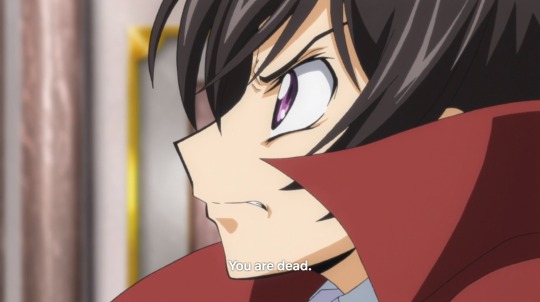
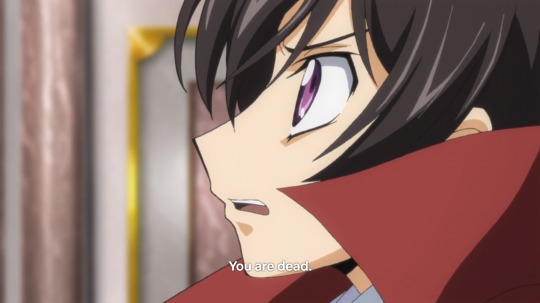
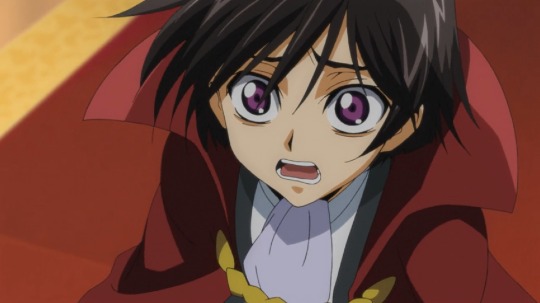
This scene in particular is the main reason I cannot imagine Lelouch or Nunnally having any kind of relationship with Charles prior to the incident, much less a secure and healthy one. You’d think the threshold for a young child to turn and publicly accuse his father of premeditated murder in front of the Britannian Royal Court would be astronomically high, especially if he actually liked and trusted him. Additionally, as I mentioned earlier, one of the most important functions of the caregiver is being a secure base in difficult and unsafe situations, which means that children typically tend to turn towards their parents during situations where they feel scared. Flinching away (so severely he even falls back, with a horrified expression on his face), rather than seeking closure, is highly indicative of insecure attachment/parental neglect.
As if all this wasn’t enough, Lelouch and Nunnally are then separated from all their siblings to be relocated to Japan as political hostages. Again, the pre-series material is pretty thin, but throughout the series there are indications that they had good relationships with some of their siblings. For example, Lelouch recalls playing chess with Schneizel, and possibly had some kind of relationship with Clovis judging by their conversation before Lelouch kills him. Both Lelouch and Nunnally also seem to have been very close with Euphie - in Stage 22.25, they’re playing in her room and don’t want to go to sleep because they’re having so much fun. Lelouch even refers to Euphie as the first girl he ever loved (let’s just... not unpack this one). Point is, not only do they get traumatised by and separated from their parents (whom they already had an insecure relationship with), but they’re also ripped away from their entire network of social support, except for each other.
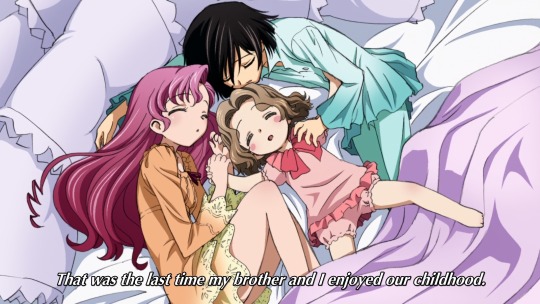
This image is so fucking sad. Fuck.
So, when Lelouch and Nunnally arrive in Japan, they’re on their own. And because he is older, and because of Nunnally’s disability, Lelouch ends up taking on most of the responsibility. He carries her up the stairs when they arrive at the shrine, washes their clothing, buys their food, and so on. In addition to these practical tasks, he also tries to comfort his sister emotionally and seems to also feel responsible for her well-being - for example, when discovering their lodgings were small and quite sad-looking, he tries to shield Nunnally from it by lying and telling her it looks like Euphie’s room. When Suzaku first meets Nunnally, Lelouch instantly runs into the room because he heard a noise, and freaks out at Suzaku because he thinks he’s going to harm her. For all intents and purposes, he steps into a caregiver role for his sister - an attachment figure, one might even say. This shift in their dynamic becomes very apparent when comparing their relationship in Japan and onwards, to the aforementioned bickering-over-a-plate incident in Euphie’s room, where they were fighting and playing like siblings.

This phenomenon is sometimes called parentification, in which the absence of adult figures providing sufficient care causes one child to bear more responsibility than is normal for the age, and step into the role of “parent”. Parentification can be adaptive and healthy with concrete/practical tasks, in small periods of time and with plenty support, for example pre-teens babysitting their younger cousins. Suffice to say, Lelouch had none of those things. He is Nunnally’s sole contact, made worse by himself by being stubborn and not wanting to let anyone else in to help. Additionally, plenty of other risk factors for destructive parentification is present - the tasks are diffuse, all-consuming and way above the level appropriate for his age, he gets no sort of recognition, reward, or help, it lasts a long period of time (permanently), generational lines become somewhat blurred, and his own needs end up taking second priority to him. And, as you’ll remember from the attachment theory section, this kind of relationship is not horizontal in nature - Lelouch and Nunnally don’t provide each other mutual support of this nature, but rather Lelouch is the one providing a function for Nunnally.
In the beginning of this section, I mentioned that Nunnally’s trauma as a result of Marianne’s death was primarily physical. However, she evidently went through a great deal of psychological trauma as well. A novel detailing their childhoods in Japan states that Nunnally privately had a terrible time coping with the changes in her life and would throw tantrums when left to her own at Kururugi residence, destroying nearly anything she could get her hands on. However, unless she secretly throws tantrums whenever her brother is off screen, this doesn’t seem to be an issue during the span of the series. I’d argue this could be attributed to Lelouch functioning as a caregiver for her - she had someone there to help her, calm her down and provide external emotional regulation, which in turn helped her learn to better regulate her emotional states on her own. Lelouch provides safety and warmth, and, in doing so, becomes a buffer for his sister.
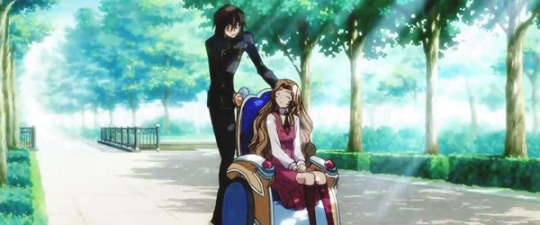
Lelouch, however, has no such buffers. Because of this, it’s easy to draw a line between his parental problems and trauma, and his subsequent maladjusted pattern behaviour when the siblings arrive in Japan. At the Kururugi residence, both him and Nunnally are offered both food and clothing, but he is insistent on providing everything himself - he washes all their clothes, and buys their food with coupons in town, despite being beat up by the other boys there for being Britannian. He’s distrustful towards everyone there (before later warming up to Suzaku) and hypersensitive for any possible threat to Nunnally’s safety. In my opinion, it’s evident Charles’ words had an impact on him. When Suzaku asks why he is so hellbent on refusing help, he responds with: “I’ll live by my own strength, and I won’t be dead any longer!” Through caregivers, children learn what to expect from the world and their own place in it - in Lelouch’s case, he clearly sees the world as an unsafe place with few people to truly trust, and considers himself only worth something if he is entirely independent. Although independence is often seen as a “mature” trait in children and therefore indicative of “good” development, healthy dependence and attachment in childhood is crucial for the facilitation of later healthy independence. And unlike Nunnally (who has him), he doesn’t have anyone to rely on and turn to for his security.
Diverting slightly from the topic at hand, I think this highlights the interesting narrative role of C.C. as the closest thing Lelouch has to a caregiver proxy. I am in no way trying to imply she is outright maternal towards him, but she’s of help and offers practical and sometimes emotional support - a role no other person in Lelouch’s life really fills. I already explained why Nunnally isn’t a possible candidate, and Suzaku, while an important figure in Lelouch’s life, has his own essay-worthy plate of parental problems to deal with. Additionally, their whole enemy situation doesn’t make him someone Lelouch can reliably turn to for comfort and support. C.C however, is older, wiser, more “stable”, and seems to know how to offer emotional support in a way that somewhat calms Lelouch down. In turn, he occasionally tries to reach out to her in difficult situations (or at least he gives into having breakdowns in front of her), which he doesn’t seem to do with anyone else. If only she’d intervened when he was a child instead of just standing there dramatically in the background. But alas.
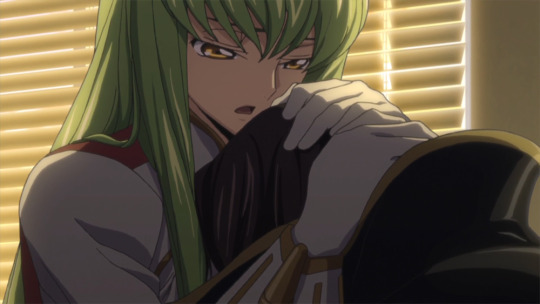
V. Some Things Just Stick in Your Mind: Differential Susceptibility
Earlier, I briefly mentioned Nunnally being the one most harmed by Marianne’s death. She was younger when it happened, more directly involved, and experienced a greater loss of function as a result which altered her lifestyle significantly. Based on this, I could easily argue that the incident would have far more damaging implications for her long-term psychological well-being compared to her older brother. I could, but I won’t, because it didn’t. Despite all these risk factors present in Nunnally’s case, their mother’s death seems to have made far more of a long-term impact on Lelouch. We’ve already discussed the most important reason why: Lelouch providing Nunnally with protective care associated with a secure parent, thus functioning as a buffer for her trauma. In this section, I’d like to discuss another important factor, interacting with attachment security: namely, differential susceptibility (also sometimes called responsiveness for care).
When we meet Lelouch in the beginning of Code Geass, he feels stuck and utterly powerless in his situation. He gambles on chess to pass time, but feels otherwise bored, restless and detached from his environment. When he receives the power of Geass from C.C., it gives him what he claims he wanted all along - a tool to take control of his life, get revenge on those who wronged him and actually do something. Thus, a plan to overthrow the Britannian Empire is formed and set into motion. The main targets seem to be the royal family as he struggles to systematically take down the empire and search for information - once he meets his brother Clovis, he shoots him (seemingly) without much hesitation. As time goes on, he sacrifices more and more time and energy to his obsessive goal, while his web of lies and various interpersonal becomes increasingly difficult to manage. There is a reason his character is often compared to the likes of Light Yagami (despite them having completely opposing ideologies, but that’s an essay topic for another day) - his arc follows the same downward spiral pattern, where one thing leads to another and suddenly you’re up to your ears in civilian casualties. It’s obvious Lelouch hasn’t accepted, gotten over, or forgiven his family in the slightest, and takes this anger out on those he perceives wronged him in search of an answer.
Meanwhile, Nunnally doesn’t exhibit anything close to this kind of grudge. She seems upset whenever it is brought up, but otherwise seems to have made peace with what happened and ready to forgive her family. One might argue this comes down to a difference of opportunity - Nunnally doesn’t exactly have the power of Geass, or even functioning eyes of the non-mind control variety, so it might be a bit more difficult to get certain things done. Such as killing off most of the Britannian royal family. However, even before Lelouch got the power of Geass, he expressed a wish to destroy Britannia for what they did to him and his sister. So, unless Nunnally has some secret desire to kill that was just never mentioned (in which case this whole essay is null and void, I suppose), Lelouch seems to be coping with his trauma in a much more maladaptive way than his sister, turning his sadness and feelings of rejection into anger and resentment, which ended up staying with him pretty much until the day he died.
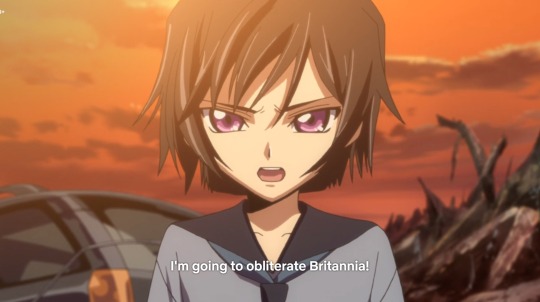
Reach your arm out and grab the stars or whatever that quote from LoGH is.
Based on this, I’d argue Lelouch is what one might call a flexible strategist. This doesn’t refer to his military tactics (although he seems pretty flexible with those as well) but simply means that, for better and for worse, he’s relatively sensitive to factors and people in his external environment. On one hand, he seems to flourish in environments where he gets support. During his childhood in the Imperial Palace, he seemed to mostly get along with and care about his siblings (as mentioned earlier). He was also by all accounts a very bright child - he did say he never managed to beat Schneizel at chess, but to give Lelouch some credit here, Schneizel at the time would have been an adult man in his early 20s, while Lelouch was, like, 7. The fact he even stood a chance is fairly impressive. I do not want to argue chess ability is the ultimate measurement of childhood functioning, but my point here is this: he seemed to be on a decent developmental path, both cognitively and socially, all things considered. On the other hand, he tends to react poorly whenever something goes wrong. I’ll talk about this in more depth in the emotional development section, but tl;dr: Lelouch is a very volatile character, who tends to have very high highs and low lows.
While Lelouch seems to be more “formable” by both positive and negative environmental influences, Nunnally is more of a so-called fixed strategist. She, like Lelouch, seemed to be in a decent place before the incident, had a period of acting out after her trauma (throwing tantrums etc.), but got “back on track” through Lelouch fairly quickly. She seems more forgiving of her family, for example when she is instantly supportive of Euphie’s special administrative zone (which Lelouch has a very ambivalent relationship with). Towards the endgame in S2, she even aligns herself with Schneizel. As her arc goes on, she shows herself more and more capable of functioning without Lelouch’s help, and make decisions of her own, based on her own opinions. Her outlook on the world seems to be much more down-to-earth and less black and white. Even when her own brother (the only person she’s been able to rely on for most of her life) geasses her and literally leaves her lying on the floor, she tries to reason with him. This is obviously just speculation, but I think had something similar happened to Lelouch he would have, psychologically speaking, completely lost it (in fact, he does lose it multiple times, which I’ll also get back to). Additionally, from the glimpse we see of Nunnally with Suzaku after Zero Requiem, it seems like she’s been able to cope relatively well with her brother’s death. In general, she seems to find her feet much easier than Lelouch and is more stable across situations.

To summarise everything so far: I’d argue neither Charles nor Marianne were secure caregivers for Lelouch and Nunnally. This is implied not only by their traits and actions, but can be inferred from Lelouch’s maladaptive developmental path. The reason we see this pattern develop in Lelouch but not Nunnally is that he, through parentification, functioned as a buffer for her. Furthermore, this difference in trajectories is amplified by their different underlying susceptibilities - Lelouch more sensitive/formable by negative events and loss in general, while Nunnally is more resilient. From this point on I’ll focus mainly on Lelouch, and discuss how this magnificent cocktail of risk factors explain his developmental outcomes as an older teenager - in particular, how it shines through when it comes to his emotionality, identity, and goals/motivations.
VI. Thunder in Our Hearts: Emotional Development and Interpersonal Relationships
Lelouch frequently throughout the series, for lack of a better term, loses his absolute shit. For example, in the scene where he plays chess with Mao in S1 E16, he screams and dramatically falls backwards when the last piece is thrown onto the scale. He’s completely devoid of expression, and is well and truly out of it until Suzaku arrives. He ends up in a similar state of mind when he thinks Nunnally is killed in S2, where it seems like he’s completely detached from his surroundings - just repeating that he wants to speak with her. In addition to these dissociative-esque states in response to extreme stress, he has lesser breakdown and outbursts as well, such as: after Shirley’s father dies, after the incident with Euphie, when he’s flipping out at Rolo upon seeing his phone locket, etc. Additionally, he’s been shown to take stress and anger out on other people in the (kinda hilarious) scene where he goes to an abandoned street to use his Geass on random people, making them dance as he stands there being angsty. These bursts of emotion don’t exclusively concern negative situations either, as evidenced by his multiple periods of manic laughter and monologues during battle.
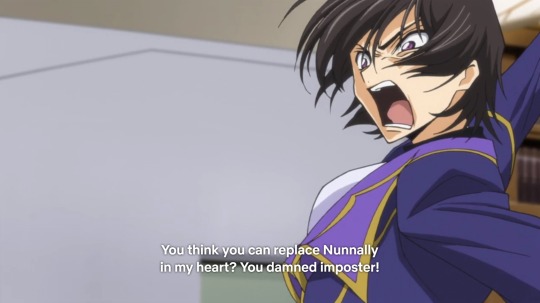
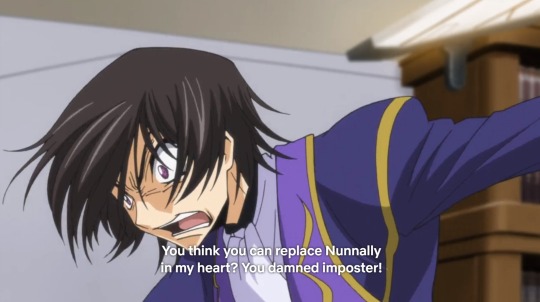
I once read this Geass analysis claiming Lelouch is an unemotional character. As evidenced by these screenshots, that was a correct take and not inaccurate at all. Emotions? Where?
In addition to being fairly emotional, Lelouch’s character is also very centered around the people in his life. His mother and sister are the primary motivation through the series. He uses Nunnally’s well-being to justify his actions. He let’s C.C. comfort him. He cares greatly about Shirley, and is devastated at her father’s death (though one can only assume he feels a bit better after punching a wall in the shower), to the point where he erases her memory to spare her the suffering he’s bringing by getting her involved. He obviously deeply cares about Suzaku (again - essay for another day), and orders him to keep on living no matter what, despite him being the number one obstacle for Zero’s plans. If he expresses this affection in a reasonable way is another question entirely - his main way of expressing his love for Nunnally seems to be killing thousands of people for her sake, Shirley by erasing her memory, and Suzaku by forcing him to live on at any cost, which is the exact opposite of what he wanted.
He also has a recurring pattern of requiring a lot of external emotional regulation through other people. Nunnally is the most obvious example of this (obviously) - whenever something goes slightly wrong, he usually defaults to screaming about her, and becomes absolutely devastated whenever she’s unsafe. If Lelouch functions as her buffer, I’d say she’s her crutch. He heavily leans on her for justification and a purpose in life. But, these maladaptive ways of leaning on people also occurs with other characters, such as in the scene with Kallen in the warehouse where he’s about to inject himself with refrain. Kallen takes the needle from him and throws it on the ground, and he reacts by walking towards her asking her to console him - saying “there are things a woman can do for that, right?”. Kallen promptly (rightfully) slaps him, and he seems to regain his senses.
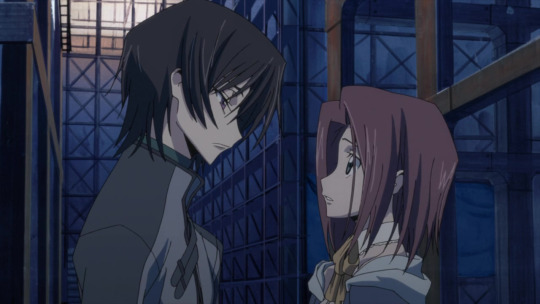
The most frequently repressed scene by all Lelouch fans.
In summary, I’d argue Lelouch is the complete opposite of an unemotional or uncaring character. He often seems to struggle with controlling his (plethora of) emotions in healthy ways, and copes with them either through completely shutting things out, having frequent breakdowns, lashing out on others, or using people as emotional crutches. He’s also very centered around other people, but tends to express it in less-than-appropriate ways, and goes on about things in an almost childish way, at times. This, I think, is indicative of his insecure attachment and lack of sensitive caregivers. In contrast to Nunnally, who had him, he didn’t have anyone to provide safety and externally regulate his emotions, meaning he was never able to internalise such strategies. Thus, there is a pattern of unhealthy (lack of) regulation of emotional states, leading to these stark contrasts between high and low points, and the quite bad ways he deals with them. Years of stress, repressed restlessness and unhealthy coping mechanisms for trauma certainly didn’t help either. Put simply - he’s a bit emotionally immature, and this is a significant aspect of his character.
VII. Reflektor: Identity and Projection
One of the most prevalent motifs in Lelouch’s arc, save for the chess symbolism, is the theme of masks and a fragmented identity. Throughout the series, he uses different identities to fill different roles in his life: Lelouch vi Britannia the prince, Lelouch Lamperouge the student, Zero the terrorist/freedom fighter and eventually Lelouch vi Britannia again, the tyrannical 99th Emperor of the Holy Britannian Empire. This switch is the most obvious display of the fragmented identity theme, as he is quite literally changing his name and masquerading as different people. With his Zero persona he even puts on a literal mask to conceal his face, but he also uses subtler, figurative masks for his other personas in order to achieve various goals. Additionally, there are also subtler role shifts at play within these identities: Lelouch Lamperouge exists as Nunnally’s caregiver, a student council member, Suzaku’s childhood friend, etc. (as with all people, fictional or not).
It is here his main ideological conflict with his parents arises. Charles and Marianne wants, through their Ragnarök plan, to abolish all “masks” and fuse mankind into one collective unconscious. Their reasoning is that if everyone were honest and there were no separation between people, the world would be a better place. Lelouch, however, finds the concept of identity masks useful and even defines himself by them. This is clearly shaped by his own experience - in order to survive in Area 11 and protect his sister, he had to change his name and lie. In order to gain real power and influence to overthrow Britannia, he had to change his name and lie. This modus operandi goes straight to the heart of his identity, because it is the reason he is able to exert his will over the world in any meaningful way - which, as we discussed earlier, is the reason he is “not dead any longer”. His core idea is that those who are privileged enough to be able to tell the truth about themselves, have no right to deny others the right to lie for their own survival or to achieve their goals.

Carl Jung arguably had a much more significant impact on anime than he did psychology. Actually, this isn’t even arguable.
Another, subtler way the series conveys the theme of fractured identity is Lelouch’s projection of desires and wishes onto others. This is shown quite literally through how the Geass gives him the power to command anyone to do anything. But not only does he impose his will onto others through verbal command, he also projects his more abstract goals and desires into the people in his life. Again, Nunnally is the most obvious example of this: Everything he does, he claims is for the sake of Nunnally. It’s interesting he never outright says that he wanted to do any of this for any personal reason - it’s all about a kinder world for Nunnally, Nunnally’s smile, and how their parents abandoned them. In the final confrontation with Charles and Marianne, Suzaku asks him if he used Nunnally as an excuse to justify his actions. Lelouch confirms this, and then says he fought to protect everything he wanted to protect. Still, he never mentions he feels rejected, or that he would want to grow older in a kinder world, even though it’s obviously more his own wish than hers (as Nunnally mentions during Zero Requiem, she would have been happy just being with her brother). In a way, he considers himself two steps removed from his desires - only working against Britannia on the basis of what he imagines the people in his life would want him to do.
Lelouch also has a tendency to view his own identity(-ies) through abstract symbols, rather than as a concrete human being with a backstory, grudges and motivations. In exile he expresses frustration at being a pawn of Britannia, as Zero he functions as a faceless symbol of Japanese liberation and a rebellion against the establishment, and as Emperor he aims to become a symbol of people’s hatred towards their oppressors. Even the orchestration of his life’s ending is primarily a symbolic act to him; with the world’s hatred focused on a tyrannical Emperor, the world can be peaceful when that symbol disappears. Lelouch seems very aware of this himself: that he is past the point of no return, and destined to become someone who will bear the burden of sacrificing his own identity, morals and character to play a part. He, in a way, seems more comfortable in this realm of abstraction - in being more of a symbol. However, if we try to strip away his rather grand narrative for a second, we’re left with a person committing suicide at 19 because he thinks the world will be a better place for it.
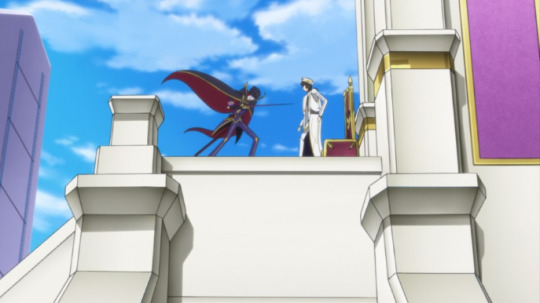
Black king captures e1, checkmate.
VIII. Pity the Child: Politics and Spite
Lastly, I want to make the argument that the parental abandonment Lelouch and Nunnally experienced, and the subsequent cascade of issues is the most important aspect of the series. Even more so than the central ideological conflict of working against versus within systems of oppression. As I’ve already touched on a fair bit, I think Lelouch’s circumstances growing up and the experiences arising from that was the very foundation for his later ideology and hatred for Britannia, rather than his ideology in and of itself being the reason he hates his parents and the system they represent. This is best represented by the climax of the scene with Charles and Marianne in C’s world, where Lelouch speaks not of systems of power, racism, oppression, politics, etc. - he speaks of abandonment and hurt.
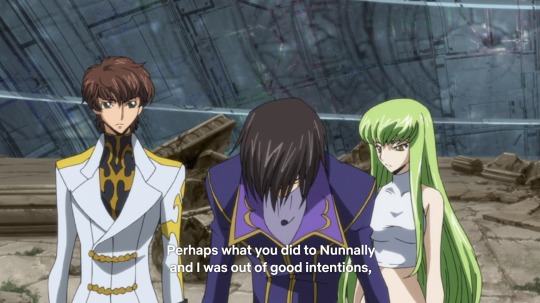
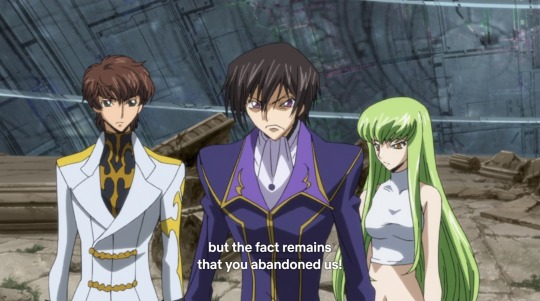
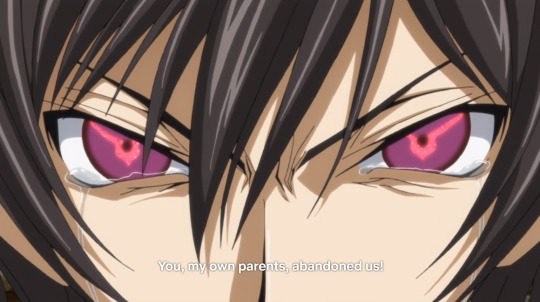
In my opinion, there’s reason to question whether he would have gone to the same lengths to destroy Britannia if he’d not been exiled from the system himself. In one of the picture dramas from his summer in Japan as a child, he lectures Suzaku on Britannian and Japanese foreign trade policy, making the argument they’re both unethical. This indicates he already knew of and disagreed with the actions of Britannia, but it’s only after he’s exiled and war is declared on Japan he begins talking about enacting revenge. Additionally, he has some truly magnificent displays of hypocrisy throughout the series that (in my unpopular (?) opinion) puts Suzaku to shame. Even the very act of him using Geass is contradictory to his fundamental belief: that opposing a well-intentioned act upon others is no different from an evil act. During their confrontation, he is very concerned with expressing this ideology to his parents, before promptly turning around and making his brother a geassed slave forever, two episodes later.
Not to completely undermine his ideological streak; I do genuinely believe he is anti-Britannia, and I do genuinely believe he values personal freedom highly. However, based on everything discussed so far, I’d argue he would perhaps not have cared as much, or at least been more open to a more Suzaku-esque approach, had he not had deep personal trauma connected to the whole situation as well. So, his main motivation isn’t to “bash the fash”, as it were, but rather bash these few specific fash who traumatised him and his sister before shipping them off to a foreign country they then immediately declared war on. Revenge, spite, and pure, childish anger towards a family that wronged him is a much more useful lens through which to view the series, rather than an ideological conflict per se.
IX. The Conclusion Bit, Finally
To summarise this entirely too long essay, Lelouch and Nunnally both suffered from insecure attachment and later trauma and parental abandonment. Nunnally’s main protective factor/buffer for this trauma was Lelouch, which gets her “back on track” towards becoming an emotionally stable and independent girl. Her brother, however, doesn’t have anyone to fill this role, and this cascades into dysfunctional behaviour and strategies across different domains: his trust issues as a child, obsession with revenge, immature emotionality, poor handling of stress, projecting onto others, and a fragmented concept of his own identity. Lastly, I think these personal issues constitute the crux of his motivation throughout the series - Lelouch’s arc is about trauma, parental neglect and spite more than it ever was about politics.
#code geass#lelouch vi britannia#lelouch lamperouge#nunnally vi britannia#@ everyone who's ever wanted to read a Long essay on code geass and developmental psychology: you're welcome#I hope some of it is understandable or even interesting#my essays#.........that's a VERY optimistic tag but I feel like I have to tag it with Something#analysis
219 notes
·
View notes
Text
As I tried to watch Trump's defense team, all I could think of was the pain the nation suffered under Dershowitz in his defense of OJ Simpson and Jeffrey Epstein and Ken Starr's runaway investigation of Bill Clinton. As Benjamin Wittes said "Does Ken Starr know who Ken Starr is?" The lack of self awareness is jaw dropping. #TrumpImpeachmentTrial
LEAKED BOLTON BOOK THREATENS TO UPEND SENATE IMPEACHMENT TRIAL
By Erica Werner, Paul Kane and Seung Min Kim | Published January 27 at 9:09 PM EST | Washington Post | Posted January 28, 2020 |
Sensational revelations from President Trump’s former national security adviser threatened to upend the Senate impeachment trial Monday, increasing the chances that senators would vote to allow witnesses in a perilous development for the White House.
Inside the Senate chamber as the trial entered its second week, Trump’s lawyers pushed forward with their defense of the president, largely ignoring the uproar caused by leaked details from a book by former national security adviser John Bolton. As part of their defense, they pivoted into a sharp line of attack on former vice president Joe Biden and his son Hunter over their involvement in Ukraine.
But outside the chamber, GOP senators caught unaware by the Bolton news grappled with divisions in their ranks and fresh calls from a small group of moderates who want to hear from Bolton before the third presidential impeachment trial in U.S. history comes to a close.
Details that became public Sunday from Bolton’s unpublished book manuscript suggest that he could provide direct evidence that Trump sought to deny security assistance to Ukraine until Kyiv announced investigations into political opponents, including the Bidens. That linkage is at the heart of House Democrats’ case that Trump abused his power in holding up the Ukraine aid for his personal political benefit and then obstructed Congress’s subsequent investigation.
“I think it’s increasingly likely that other Republicans will join those of us who think we should hear from John Bolton,” Sen. Mitt Romney (R-Utah) said Monday, repeatedly calling Bolton’s testimony “relevant.” “It’s important to be able to hear from John Bolton, for us to be able to make an impartial judgment.”
Sen. Susan Collins (R-Maine), another key moderate, said the reports about Bolton’s unpublished manuscript “strengthen the case for witnesses and have prompted a number of conversations among my colleagues.” At least four Republicans would have to join with all Democrats for a vote to call witnesses to succeed, an outcome Majority Leader Mitch McConnell (R-Ky.) has sought to avoid because of the potential for the trial to devolve into a drawn-out mess.
Trump himself has vehemently denied any political motivation in stalling the Ukraine aid. He has insisted he never told Bolton that he was holding up the nearly $400 million in aid to force Kyiv to announce political investigations, suggesting that if Bolton said otherwise, it was only to sell books.
Trump’s attorneys devoted some of their floor time Monday to arguing that Trump acted appropriately in delaying the security aid, and that he did so because of his concerns about corruption in Ukraine and whether other nations were doing their fair share in providing security support for Ukraine.
The president’s defense team referenced the Bolton news obliquely shortly after the impeachment trial opened at 1 p.m., with Chief Justice John G. Roberts Jr. presiding and the sergeant-at-arms intoning his customary order for senators to stay silent “on pain of imprisonment.”
“We deal with transcript evidence, we deal with publicly available information,” said Trump attorney Jay Sekulow. “We do not deal with speculation, allegations that are not based on evidentiary standards at all.” A senior administration official, speaking on the condition of anonymity to discuss internal strategy, confirmed that Sekulow’s comments were a reference to the Bolton news.
Hours later, as constitutional-law professor Alan Dershowitz delivered the final arguments of the day, he briefly referenced the Bolton news as he argued that the charges against Trump do not constitute impeachable offenses. “Nothing in the Bolton revelations, even if true, would rise to the level of an abuse of power or an impeachable offense,” he said.
The signs of confusion among Senate Republicans over the Bolton revelations emerged early Monday at a news conference that was originally billed to have several Republicans but that dwindled to just Sens. Mike Braun (Ind.) and John Barrasso (Wyo.). Both senators said Trump remained on track to be acquitted, but while Barrasso dismissed the Bolton news as a “so-called blockbuster report” that contained “selective leaks,” Braun acknowledged its potency.
“I think what it does is, it’s taken an already hot topic and added some fuel to the fire,” Braun said.
Later, in a further sign of disunity, the newest Republican senator, Kelly Loeffler (Ga.), who was appointed last month, attacked Romney on Twitter. Loeffler, who has been a major donor and supporter for Romney in the past, contended Monday that he wanted to “appease the left by calling witnesses who will slander the @realDonaldTrump during their 15 minutes of fame.”
Much of the Republican lunch that preceded Monday’s trial proceedings centered on the question of witnesses, according to senators and other officials directly familiar with the meeting. The outcome of the witness vote in coming days could determine whether the trial is over by week’s end or extends into an uncertain future.
Romney spoke about the need to call additional witnesses, and Sen. Bill Cassidy (R-La.) also raised concerns. Cassidy noted that the White House has argued that there were no direct witnesses to any allegation of a quid pro quo, but that now a potential direct witness in the form of Bolton has emerged, according to an official with direct knowledge of the lunch who spoke on the condition of anonymity to describe the private discussion. Cassidy declined to comment about his remarks.
Democrats say calling witnesses is necessary for a complete trial, especially since Republicans have accused Democrats of relying on hearsay. In addition to Bolton, Democrats would like to hear from acting White House chief of staff Mick Mulvaney and several other officials.
“We want Bolton. We want Mulvaney. They heard from the president,” said Senate Minority Leader Charles E. Schumer (D-N.Y.).
One conservative senator, Patrick J. Toomey (R-Pa.), has spoken with Romney and other colleagues in recent days about possibly summoning two witnesses to the trial, one called by Republicans and one by Democrats, according to three Republican officials who spoke about the private discussions on the condition of anonymity. Toomey has argued that a “one for one” arrangement could force Democrats to accept a Republican witness against their wishes or else risk having Republicans move ahead to acquit Trump, the officials said.
However the question of witnesses is resolved, there remains little doubt that Trump will be acquitted in the end. Although it would take only a simple majority vote to call witnesses, a two-thirds vote is required for conviction.
As the debate over Bolton’s testimony and the potential need to call witnesses raged outside the Senate on Monday, Trump’s legal team inside the chamber delivered on its promise to turn its attention to Hunter Biden, and whether his role on the board of Ukrainian energy company Burisma gave the president good reason to ask his Ukrainian counterpart to investigate. Trump made that request in a July 25 phone call.
Pam Bondi, a former Florida attorney general who is a member of Trump’s defense team, laid out a detailed chronology of Hunter Biden’s five years on the board and how they dovetailed with the official actions of his father, then-Vice President Joe Biden, in Ukraine, as well as the campaign to oust former prosecutor general Viktor Shokin over corruption allegations.
Bondi relied heavily on illustrating the concurrent timeline of events, noting how many days transpired between Shokin’s ouster and the elder Biden’s announcements that the United States would provide security assistance to Ukraine.
She used several clips from mainstream newspapers and television networks about Hunter Biden’s Burisma connections to reinforce the idea that there was legitimate reason to scrutinize his hefty monthly paycheck, and played video clips from witnesses in the impeachment inquiry who testified that they found Hunter Biden’s role on the Burisma board troubling.
Joe Biden’s actions with regard to Shokin were in line with official U.S. and European policy objectives. And though Bondi provided no proof that Joe Biden’s actions vis-a-vis Ukraine were influenced by trying to advantage his son, that did not seem to be the ultimate goal of raising questions about the motivations behind the Bidens’ activities.
“All we are saying is that there was a basis to talk about this, to raise this issue,” Bondi said at the close of her presentation.
As Joe Biden’s name was invoked on the Senate floor, he was campaigning in Iowa, where Democratic voters will caucus in just a week’s time. Biden is a front-runner in the Democratic primary field, which Democrats say explains Trump’s desire for Ukraine to announce investigations targeting him and his family. A Biden campaign spokesman released a statement deriding Bondi’s remarks as a discredited “conspiracy theory.”
For members of the president’s legal team, it was the second day of their defense, after they began Saturday with an abbreviated two-hour summary. Each side is allowed 24 hours to present its case, and the House Democratic impeachment managers took nearly all their allotted time last week, repeatedly pushing the trial late into the night, to the irritation of some GOP senators. Trump’s team has promised to be more brief, although its presentation was continuing into the evening hours Monday and was expected to resume Tuesday.
Last week, Trump’s attorneys had to sit quietly and watch while the House Democratic managers delivered their arguments, but Monday the roles were reversed and the seven House managers sat quietly looking on as one member of Trump’s defense team after another rose to address different aspects of the proceedings.
The first Trump lawyer to speak at length was Kenneth Starr, the former independent counsel whose expansive investigation of Bill Clinton led to Clinton’s impeachment by the House in 1998 and subsequent acquittal by the Senate. Starr talked about the constitutional basis for the impeachment process, contending that it is at risk of being abused unless today’s Senate acts to stop it. Many Democrats viewed the presentation as the height of hypocrisy.
“We are living in what I think can aptly be described as the age of impeachment,” Starr said. “. . . Impeachment has now been normalized.”
______
Karoun Demirjian, Robert Costa, Rachael Bade, John Wagner, Elise Viebeck and Mike DeBonis contributed to this report.
*********
"That's rich... Pam Bondi defending trump's quid pro quo. If you recall in 2013, she was the Florida's AG who received a $25,000 check from trump for her reelection campaign, then announced that her office would not be acting on the Trump University complaints filed by multiple states. Talk about a quid pro quo. Ms. Bondi needs to take a good long look in the mirror."
NWHEELS, SF, CA
BOLTON REVELATIONS ANGER REPUBLICANS, FUELING PUSH FOR IMPEACHMENT WITNESSES
The former national security adviser’s account threatened to derail Republican hopes of bringing President Trump’s impeachment trial to a quick close with his acquittal.
By Michael D. Shear and Nicholas Fandos | Published Jan. 27, 2020 Updated Jan. 28, 2020, 7:00 a.m. ET | New York Times | Posted Jan 28, 2020 |
WASHINGTON — The White House and Senate Republican leaders struggled on Monday to salvage their plans for a quick acquittal of President Trump after a new account by his former national security adviser John R. Bolton corroborated a central piece of the impeachment case against him.
The newly disclosed revelations by Mr. Bolton, whose forthcoming book details how Mr. Trump conditioned military aid for Ukraine on the country’s willingness to furnish information on his political rivals, angered key Republicans and reinvigorated a bid to call witnesses. Such a move would prolong the trial and pose new dangers for the president.
A handful of Republicans appeared to be moving closer to joining Democrats in a vote to subpoena Mr. Bolton, even as their leaders insisted that doing so would only delay his inevitable acquittal.
“I think it’s increasingly likely that other Republicans will join those of us who think we should hear from John Bolton,” Senator Mitt Romney, Republican of Utah, told reporters. He later told Republican colleagues at a closed-door lunch that calling witnesses would be a wise choice politically and substantively, according to people familiar with the discussions.
As they opened the second day of their defense, Mr. Trump’s lawyers largely ignored the revelations from Mr. Bolton, reported on Sunday by The New York Times, that bolstered the abuse of power case made by the House Democratic prosecutors.
Instead, the White House team is doubling down on a defense that is directly contradicted by the account in Mr. Bolton’s book, due out in March. Mr. Trump’s lawyers told senators that no evidence existed tying the president’s decision to withhold security aid from Ukraine to his insistence on the investigations. They say the investigations were requested out of a concern for corruption in Ukraine.
“Anyone who spoke with the president said that the president made clear that there was no linkage between security assistance and investigations,” said Michael Purpura, the deputy White House counsel.
Mr. Trump’s legal team also sought to turn the Democrats’ accusations on their head.
They defended and played down the role of Rudolph W. Giuliani, the president’s personal lawyer who was at the center of Mr. Trump’s Ukraine pressure campaign, calling him a “shiny object” Democrats were brandishing to distract from a weak case. They sought to raise doubts about former Vice President Joseph R. Biden Jr. and his son Hunter Biden, suggesting they were corrupt.
And they continued to argue that Mr. Trump’s actions were far from impeachable.
Alan M. Dershowitz, a celebrity Harvard law professor, argued that the Constitution holds that impeachment is for “criminal-like behavior,” telling senators that the country’s founders “would have explicitly rejected such vague terms as ‘abuse of power’ and ‘obstruction of Congress’ as among the enumerated and defined criteria for impeaching the president.”
The theory has been rejected by most constitutional scholars.
As evening set in, Mr. Dershowitz made the legal team’s only reference to Mr. Bolton, telling senators that the description of Mr. Trump’s actions in his manuscript “would not constitute an impeachable offense.”
He added, “Let me repeat: Nothing in the Bolton revelations, even if true, would rise to the level of an abuse of power, or an impeachable offense.”
Behind closed doors, Republicans were singularly focused on the former national security adviser’s account, which stoked turmoil in their ranks and opened cracks in their near monolithic support for the White House strategy of denying witnesses and rushing toward a final verdict, almost certain to be an acquittal.
Senator Mitch McConnell, Republican of Kentucky and the majority leader, sought to calm his colleagues at the private lunch, telling them to “take a deep breath” and not to leap to conclusions about how to proceed.
But according to people familiar with Mr. McConnell’s thinking, he was angry at having been blindsided by the White House about Mr. Bolton’s manuscript, which aides there have had since late December. The leader put out a statement saying that he “did not have any advance notice” of Mr. Bolton’s account.
Just before the trial got underway on Monday, Senator Patrick J. Toomey, Republican of Pennsylvania, told colleagues that he might be willing to support calling witnesses as long as the roster would include someone friendlier to Mr. Trump’s case, like Hunter Biden, according to people familiar with the gathering who were not authorized to discuss it. The idea appeared to be gaining broader currency among Republicans.
“My expectation is that were there to be testimony from Mr. Bolton, there would be testimony for someone on the defense side as well,” Mr. Romney said.
So far, only Mr. Romney had publicly committed to voting in favor of new witnesses.
But even Senator Lindsey Graham, Republican of South Carolina and usually a reliable Trump ally, said that Mr. Bolton “may be a relevant witness” and that he would like to see a copy of Mr. Bolton’s manuscript.
At the White House, Mr. Trump raged throughout the morning at Mr. Bolton, accusing him of lying. Hosting Israeli leaders, the president told reporters that he had not seen the manuscript of the former adviser’s book but disputed its claims as “false.”
In a series of early-morning tweets hours before the trial resumed, the president accused Mr. Bolton of telling stories “only to sell a book” and defended his actions toward Ukraine as perfectly appropriate.
“I NEVER told John Bolton that the aid to Ukraine was tied to investigations into Democrats, including the Bidens,” President Trump wrote just after midnight.
But Mr. Trump later complained to associates that the presentations from his defense team were boring.
As the session progressed, Mr. Trump’s lawyers began their promised assault on Mr. Biden and his son, asserting that Mr. Trump demanded investigations of them because there was significant evidence that they were corrupt.
They methodically sought to undermine the case that House managers delivered over more than 22 hours of arguments last week. They argued that Mr. Trump said nothing wrong on a July 25 call with the president of Ukraine, never sought to leverage an Oval Office meeting, and did more to support Ukraine against Russian aggression than previous presidents.
“The managers have not met their burden, and these articles of impeachment must be rejected,” Eric Herschmann, one of the president’s lawyers, told senators.
In a somewhat improbable echo of the last presidential impeachment trial, Ken Starr, who relentlessly pursued President Bill Clinton for lying about an extramarital affair with a young aide, appeared before the Senate to defend Mr. Trump. He argued that the president committed no impeachable offense and urged senators to “restore our constitutional and historical traditions,” in which impeachment was rare.
“Like war, impeachment is hell,” Mr. Starr told senators, casting himself as a skeptic of the constitutional remedy that he enthusiastically pursued 21 years ago. “Or at least, presidential impeachment is hell.”
While it is not clear that Republicans will vote to call additional witnesses when they vote on the issue this week, the revelations from Mr. Bolton appeared to shift the dynamic that had taken hold at the end of last week’s arguments, when it appeared unlikely that Democrats would win the support of the four Republicans they need to force the issue.
On Monday, Democrats said they were newly optimistic that the momentum of the trial was pushing toward a vote for witnesses and documents, and they worked to increase the pressure on hesitant Republicans to embrace the moves.
“It boils down to one thing: we have a witness with firsthand evidence of the president’s actions for which he is on trial,” said Senator Chuck Schumer of New York, the Democratic leader. “He is ready and willing to testify. How can Senate Republicans not vote to call that witness and request his documents?”
Senator Susan Collins, Republican of Maine, who had previously indicated she would most likely support additional witnesses, said the details in Mr. Bolton’s book “strengthen the case for witnesses and have prompted a number of conversations among my colleagues.” Senator Lisa Murkowski, Republican of Alaska, said she was “curious” about what Mr. Bolton would say, but gave no hint of how she would vote on the matter.
But Republican leaders played down the significance of Mr. Bolton’s account.
“The best I can tell from what’s reported in The New York Times, it is nothing different from what we have already heard,” Senator John Cornyn, Republican of Texas, said on Fox News.
Mr. Herschmann and Pam Bondi, another of Mr. Trump’s lawyers, delved deeply into Hunter Biden’s work on the board of Burisma, a Ukrainian energy company, at the time his father was vice president, suggesting it was improper for him to hold the post while his father served. Ms. Bondi also noted that the elder Mr. Biden had called for the removal of prosecutor who had looked into Burisma.
“What we are saying is that there was a basis to talk about this, to raise this issue,” Ms. Bondi said.
But it was United States policy at the time that the prosecutor, who was widely regarded as corrupt, should be removed, and there was no evidence at the time of his firing that the prosecutor was actively pursuing an investigation.
In a statement on Monday, Andrew Bates, the Biden campaign’s rapid-response director, said: “Here on Planet Earth, the conspiracy theory that Bondi repeated has been conclusively refuted.”
Later, Jane Raskin, one of the president’s lawyers, called Mr. Giuliani a “colorful distraction” in the case, arguing that the House impeachment investigators did not subpoena him to testify because they did not think he would back up their claims that he was executing a shadow foreign policy.
“In this trial, in this moment, Mr. Giuliani is just a minor player — that shiny object designed to distract you,” Ms. Raskin said.
Mr. Giuliani defied a House subpoena for documents. Legal experts suggest he would have refused to disclose any of his conversations with Mr. Trump on the basis of attorney-client privilege even if called to testify. And he would surely have been a difficult witness, given his often erratic performance in televised interviews.
______
Reporting was contributed by Catie Edmondson, Maggie Haberman, Sheryl Gay Stolberg and Patricia Mazzei.
______
There are a lot of comments from around the world. Whether they are American diplomat or American citizens living abroad, I am reminded that the world is watching this kangaroo #TrumpImpeachmentTrial
"I continue to be deeply troubled by the dis-information that is floating around about Ukraine. The US and the EU wanted Ukraine to be approved to join NATO. Ukraine wouldn't be approved until they rooted out the pro-Putin corrupt governmental officials that were holdovers from the Yanukovych administration (Yanukovych was the Putin buddy who was deposed and fled to Russia in 2014). Victor Shokin, Yanukovych's equally corrupt prosecutor general, managed to hold onto his office after Yanukovych fled. Biden was sent on a mission specifically to get Yanukovych fired. The Ukraine Rada (Parliament) did just that. Biden was not alone in pressuring Ukraine. IMF minister Christine LeGard had already conditioned a $40 billion loan package on getting Shokin fired. Equating what Trump was doing with Zelensky with what Obama and the EU were doing with Shokin is simply preying on the fact that most Americans don't follow the news closely enough to have an informed opinion. The Trump legal team is lying in plain sight and most of the Senate is too ignorant to even realize that. Perhaps Bolton can set them straight. Sigh." SCOTT, ST. PETERSBURG FL
"I listened yesterday to the Republican defense, a defense that basically consisted of arguments of the type "is what he did bad enough for us to remove him?". What they should consider is "If he good enough to keep?" If extorting Zelensky was the only "crime" that Trump has done, I guess I could agree in some of the Republican arguments, but when put in a bigger context it should be very hard to defend a man like Donald Trump and even harder to defend him as the President of the USA." TRUTH SEEKER, PLANET EARTH
"It’s hard to know what to say isn’t it? Clearly Trump did this thing, clearly he has used the power of his office for an attempt at personal political gain and he has very clearly been obstructing justice. There is no clear defence of his position being presented by his lawyers, they don’t deny it, it will all boil down to the argument that it’s not an impeachable offence. This will set precedents for future leaders of the world to do whatever they want to do with no consequence. The rest of the world is watching this with interest, the dark players of the world watch like vultures waiting for the animal to die, the lighter players watch in horror waiting for the biggest free country to turn into an autocracy. America is setting an example in politics right now, if the right thing is not done, then democracy and freedom across the world will pay the price. Are the American people ready for the levels of mistrust, isolation and simple disappointment that will be levelled at them if Trump is aquitted?" RUSS,
UK🇬🇧
" "A handful of Republicans appeared to be moving closer to joining Democrats in a vote to subpoena Mr. Bolton, even as their leaders insisted that doing so would only delay his inevitable acquittal." In other words, even if Bolton were to testify that Trump handed the Nuclear Codes to a Russian spy, the GOP would STILL vote to acquit. So much for "Defending The Nation"!!!"
DSMESS, CALL THE BLUFF
"Ted Cruz: "the legal issue before this Senate is whether a President has the authority to investigate corruption". Maybe Mr. Cruz should read the articles of impeachment? How low can the GOP possibly go?" UB, SINGAPORE 🇸🇬
"I am embarrassed that adults are so fearful of witnesses and a legal process having its way. That is what our free society is supposed to be about, is it not? If the man is found not guilty, well, then it cannot have hurt to have heard witnesses, can it? An if he is found guilty, well, then it is surely good to have acted more in line with the famous Constitution with the truth, the whole truth and nothing but the truth and that he pays the price." STEN MOELLER, NORWAY 🇳🇴
" I don't believe, in the long run, Bolton's revelations will move the GOP needle one bit. These Senators know, far better than most us, what sort of man Trump his; they're familiar with his astounding vulgarities, his ignorance, his complete lack of morals. But it doesn't matter to them, because he has captured the base of the party, and to cross him is to ruin both your Congressional career and your value as a lobbyist after. Perhaps that's what's so infuriating about all of this. It's pure, venal self-interest that will determine the outcome." STEVEN, GEORGIA
"As a person with life-long liberal tendencies I have long been in disagreement with the political ideas of Mitt Romney and John Bolton but I salute them for putting their country before their party. If more Republicans choose to follow their lead there may be yet some hope for the Republican Party to survive. I value the two-party system wherein each party is a check on the extremities of the other. The slavish pseudo-adoration of Trump displayed by so many Republican congressmen today is destroying whatever value the Republican Party may have had in America's two-party system. Without integrity there is no respect and I find precious little integrity among Republican party members today."
CHRISTINO, WEST PALM BEACH FL
"One thing bothering me in The Times' reporting of the impeachment trial is that it's never pointed out that if trump really believed that corruption by Biden and his son ought to be investigated there are proper and effective ways to investigate - and none of these involves any announcement of investigations. Real investigations are never announced in advance because it would warn the suspects. It's clear that trump wanted a repeat of Comey's presser announcing the finding of new Clinton emails because it's likely that trump "won" the election mostly because of that one event." MARILYNN, FRANCE 🇫🇷
" Bolton should testify. Mulvaney should testify. Pompeo should testify. Guilani should testify. Frankly, I don’t care if the Bidens testify because I don’t think they have anything to offer about Trumps actions. But, whatever you think, anything that brings us closer to the truth is good. The way the Senate has chosen to proceed is a joke. I think the House made their case with or without Bolton. Although they limited the Impeachment to Ukraine, there is three years of examples of Abuse of Power and Obstruction of Congress with respect to Trump’s actions on a variety of matters. It’s pretty clear he has obstructed Justice as it pertains to The Mueller investigation as well. The GOP would be wise to convict and remove Trump. It may save their Party and the country. America is watching and the world is watching. To not turn over a few more stones in search of truth would be wrong and politically damaging." TOM BACKUS, MICHIGAN
*********
Bolton Was Concerned That Trump Did Favors for Autocratic Leaders, Book Says
The former national security adviser shared his unease with the attorney general, who cited his own worries about the president’s conversations with the leaders of Turkey and China.
By Michael S. Schmidt and Maggie Haberman | Published Jan. 27, 2020 Updated Jan. 28, 2020, 7:00 a.m. ET | New York Times | Published January 28, 2020 |
WASHINGTON — John R. Bolton, the former national security adviser, privately told Attorney General William P. Barr last year that he had concerns that President Trump was effectively granting personal favors to the autocratic leaders of Turkey and China, according to an unpublished manuscript by Mr. Bolton.
Mr. Barr responded by pointing to a pair of Justice Department investigations of companies in those countries and said he was worried that Mr. Trump had created the appearance that he had undue influence over what would typically be independent inquiries, according to the manuscript. Backing up his point, Mr. Barr mentioned conversations Mr. Trump had with the leaders, President Recep Tayyip Erdogan of Turkey and President Xi Jinping of China.
Mr. Bolton’s account underscores the fact that the unease about Mr. Trump’s seeming embrace of authoritarian leaders, long expressed by experts and his opponents, also existed among some of the senior cabinet officers entrusted by the president to carry out his foreign policy and national security agendas.
Mr. Bolton recounted his discussion with Mr. Barr in a draft of an unpublished book manuscript that he submitted nearly a month ago to the White House for review. People familiar with the manuscript described its contents on the condition of anonymity.
The book also contains an account of Mr. Trump telling Mr. Bolton in August that he wanted to continue freezing $391 million in security assistance to Ukraine until officials there helped with investigations of political rivals, The New York Times reported on Sunday. The matter is at the heart of the articles of impeachment against the president.
Early Tuesday, the Justice Department’s spokeswoman, Kerri Kupec, posted a statement on Twitter disputing aspects of Mr. Bolton’s account.
“There was no discussion of ‘personal favors’ or ‘undue influence’ on investigations, nor did Attorney General Barr state that the President’s conversations with foreign leaders was improper,” the statement said. “If this is truly what Mr. Bolton has written, then it seems he is attributing to Attorney General Barr his own current views — views with which Attorney General Barr does not agree.”
A spokesman for the National Security Council declined to comment on Mr. Barr’s conversations with Mr. Bolton. In a statement on Monday, Mr. Bolton, his publisher and his literary agency said they had not shared the manuscript with The Times.
“There was absolutely no coordination with The New York Times or anyone else regarding the appearance of information about his book, ‘The Room Where It Happened,’ at online booksellers,” Mr. Bolton, Simon & Schuster and Javelin said in a joint statement. “Any assertion to the contrary is unfounded speculation.”
Dean Baquet, the executive editor of The Times, responded that “The Times does not discuss its sources, but I should point out that no one has questioned the accuracy of our report.”
Mr. Bolton wrote in the manuscript that Mr. Barr singled out Mr. Trump’s conversations with Mr. Xi about the Chinese telecommunications firm ZTE, which agreed in 2017 to plead guilty and pay heavy fines for violating American sanctions on doing business with North Korea, Iran and other countries. A year later, Mr. Trump lifted the sanctions over objections from his own advisers and Republican lawmakers.
Mr. Barr also cited remarks Mr. Trump made to Mr. Erdogan in 2018 about the investigation of Halkbank, Turkey’s second-largest state-owned bank. The Justice Department was scrutinizing Halkbank on fraud and money-laundering charges for helping Iran evade sanctions imposed by the Treasury Department.
Mr. Erdogan had been making personal appeals to Mr. Trump to use his authority to halt any additional enforcement against the bank. In 2018, Mr. Erdogan told reporters in Turkey that Mr. Trump had promised to instruct cabinet members to follow through on the matter. The bank had hired a top Republican fund-raiser to lobby the administration on the issue.
For months, it looked as though the unusual lobbying effort might succeed; but in October, the Justice Department indicted the bank for aiding Iran. The charges were seen in part as an attempt by the administration to show that it was taking a tough line on Turkey amid an outcry over Mr. Trump’s endorsement of its incursions in Syria.
Mr. Bolton’s statements in the book align with other comments he has made since leaving the White House in September. In November, he said in a private speech that none of Mr. Trump’s advisers shared the president’s views on Turkey and that he believed Mr. Trump adopted a more permissive approach to the country because of his financial ties there, NBC News reported. Mr. Trump’s company has a property in Turkey.
Mr. Trump has repeatedly praised dictators throughout his presidency. Last year, he said, “Where’s my favorite dictator?” as he waited to meet with President Abdel Fattah el-Sisi of Egypt, The Wall Street Journal reported.
Mr. Trump’s soft spot for authoritarians dates at least to his presidential campaign, when he praised Saddam Hussein for being “good” at killing terrorists and suggested that the world would be better off were Col. Muammar el-Qaddafi, the deposed Libyan dictator who was killed in a violent uprising in 2011, “in charge right now.” Mr. Trump then suggested the ouster of both men was ultimately worse for the Middle East because the Islamic State had filled the void.
Mr. Trump declared himself “a big fan” of Mr. Erdogan as they sat side by side in the Oval Office last fall after Mr. Trump cleared the way for Turkish forces to invade Syria, though he warned Mr. Erdogan behind the scenes against the offensive.
Of Mr. Xi, Mr. Trump has been similarly effusive. When the Chinese Communist Party eliminated term limits, allowing Mr. Xi to keep his tenure open-ended, Mr. Trump extolled the outcome.
Mr. Xi had personally asked Mr. Trump to intervene to save ZTE, which was on the brink of collapse because of tough American penalties for sanctions violations.
Lifting the sanctions on ZTE, a Chinese telecommunications giant that also serves as a geopolitical pawn for its government, most likely helped Mr. Trump negotiate with Mr. Xi in the trade war between the two countries. But Republican lawmakers and others objected to helping a Chinese company that broke the law and has been accused of posing a national security threat.
Mr. Bolton’s reputation for muscular foreign policy was always an odd fit with Mr. Trump, who often threatens excessive force but rarely reacts with it. Mr. Bolton was pleased when Mr. Trump withdrew from the nuclear deal between Iran and six world powers, including the United States, that the Obama administration had entered into. Other Trump advisers had urged him against it.
But Mr. Trump’s lack of action after Iranian aggression against the United States rankled Mr. Bolton.
Mr. Bolton’s book has already netted significant sales. Shortly after the disclosure of its contents on Sunday night, Amazon listed the book for purchase. By Monday evening, it was No. 17 on Amazon’s best-seller list.
______
Eric Lipton contributed reporting.
*********
Trump Tied Ukraine Aid to Inquiries He Sought, Bolton Book Says
Drafts of the book outline the potential testimony of the former national security adviser if he were called as a witness in the president’s impeachment trial.
By Maggie Haberman and Michael S. Schmidt | Published Jan. 26, 2020 Updated Jan. 27, 2020 | New York Times | Posted January 28, 2020 |
WASHINGTON — President Trump told his national security adviser in August that he wanted to continue freezing $391 million in security assistance to Ukraine until officials there helped with investigations into Democrats including the Bidens, according to an unpublished manuscript by the former adviser, John R. Bolton.
The president’s statement as described by Mr. Bolton could undercut a key element of his impeachment defense: that the holdup in aid was separate from Mr. Trump’s requests that Ukraine announce investigations into his perceived enemies, including former Vice President Joseph R. Biden Jr. and his son Hunter Biden, who had worked for a Ukrainian energy firm while his father was in office.
Mr. Bolton’s explosive account of the matter at the center of Mr. Trump’s impeachment trial, the third in American history, was included in drafts of a manuscript he has circulated in recent weeks to close associates. He also sent a draft to the White House for a standard review process for some current and former administration officials who write books.
Multiple people described Mr. Bolton’s account of the Ukraine affair.
The book presents an outline of what Mr. Bolton might testify to if he is called as a witness in the Senate impeachment trial, the people said. The White House could use the pre-publication review process, which has no set time frame, to delay or even kill the book’s publication or omit key passages.
Just after midnight on Monday, Mr. Trump denied telling Mr. Bolton that the aid was tied to investigations. “If John Bolton said this, it was only to sell a book,” he wrote on Twitter, reprising his argument that the Ukrainians themselves felt “no pressure” and falsely asserting that the aid was released ahead of schedule.
Over dozens of pages, Mr. Bolton described how the Ukraine affair unfolded over several months until he departed the White House in September. He described not only the president’s private disparagement of Ukraine but also new details about senior cabinet officials who have publicly tried to sidestep involvement.
For example, Secretary of State Mike Pompeo acknowledged privately that there was no basis to claims by the president’s lawyer Rudolph W. Giuliani that the ambassador to Ukraine was corrupt and believed Mr. Giuliani may have been acting on behalf of other clients, Mr. Bolton wrote.
Mr. Bolton also said that after the president’s July phone call with the president of Ukraine, he raised with Attorney General William P. Barr his concerns about Mr. Giuliani, who was pursuing a shadow Ukraine policy encouraged by the president, and told Mr. Barr that the president had mentioned him on the call. A spokeswoman for Mr. Barr denied that he learned of the call from Mr. Bolton; the Justice Department has said he learned about it only in mid-August.
And the acting White House chief of staff, Mick Mulvaney, was present for at least one phone call where the president and Mr. Giuliani discussed the ambassador, Mr. Bolton wrote. Mr. Mulvaney has told associates he would always step away when the president spoke with his lawyer to protect their attorney-client privilege.
During a previously reported May 23 meeting where top advisers and Senator Ron Johnson, Republican of Wisconsin, briefed him about their trip to Kyiv for the inauguration of President Volodymyr Zelensky, Mr. Trump railed about Ukraine trying to damage him and mentioned a conspiracy theory about a hacked Democratic server, according to Mr. Bolton.
The White House did not provide responses to questions about Mr. Bolton’s assertions, and representatives for Mr. Johnson, Mr. Pompeo and Mr. Mulvaney did not respond to emails and calls seeking comment on Sunday afternoon.
Mr. Bolton’s lawyer blamed the White House for the disclosure of the book’s contents. “It is clear, regrettably, from the New York Times article published today that the pre-publication review process has been corrupted and that information has been disclosed by persons other than those properly involved in reviewing the manuscript,” the lawyer, Charles J. Cooper, said Sunday night.
He said he provided a copy of the book to the White House on Dec. 30 — 12 days after Mr. Trump was impeached — to be reviewed for classified information, though, he said, Mr. Bolton believed it contained none.
The submission to the White House may have given Mr. Trump’s aides and lawyers direct insight into what Mr. Bolton would say if he were called to testify at Mr. Trump’s impeachment trial. It also intensified concerns among some of his advisers that they needed to block Mr. Bolton from testifying, according to two people familiar with their concerns.
The White House has ordered Mr. Bolton and other key officials with firsthand knowledge of Mr. Trump’s dealings not to cooperate with the impeachment inquiry. Mr. Bolton said in a statement this month that he would testify if subpoenaed.
[ EXECUTIVE PRIVILEGE: Can Trump muzzle John Bolton?]
In recent days, some White House officials have described Mr. Bolton as a disgruntled former employee, and have said he took notes that he should have left behind when he departed the administration.
Mr. Trump told reporters last week that he did not want Mr. Bolton to testify and said that even if he simply spoke out publicly, he could damage national security.
“The problem with John is it’s a national security problem,” Mr. Trump said at a news conference in Davos, Switzerland. “He knows some of my thoughts. He knows what I think about leaders. What happens if he reveals what I think about a certain leader and it’s not very positive?”
“It’s going to make the job very hard,” he added.
The Senate impeachment trial could end as early as Friday without witness testimony. Democrats in both the House and Senate have pressed for weeks to include any new witnesses and documents that did not surface during the House impeachment hearings to be fair, focusing on persuading the handful of Republican senators they would need to join them to succeed.
But a week into the trial, most lawmakers say the chances of 51 senators agreeing to call witnesses are dwindling, not growing.
Democrats, including Speaker Nancy Pelosi and Senator Chuck Schumer, the minority leader, said the Bolton manuscript underscored the need for him to testify, and the House impeachment managers demanded after this article was published that the Senate vote to call him. “There can be no doubt now that Mr. Bolton directly contradicts the heart of the president’s defense,” they said in a statement.
Republicans, though, were mostly silent; a spokesman for the Senate majority leader, Mitch McConnell of Kentucky, declined to comment.
Mr. Bolton would like to testify for several reasons, according to associates. He believes he has relevant information, and he has also expressed concern that if his account of the Ukraine affair emerges only after the trial, he will be accused of holding back to increase his book sales.
Mr. Bolton, 71, a fixture in conservative national security circles since his days in the Reagan administration, joined the White House in 2018 after several people recommended him to the president, including the Republican megadonor Sheldon Adelson.
But Mr. Bolton and Mr. Trump soured on each other over several global crises, including Iranian aggression, Mr. Trump’s posture toward Russia and, ultimately, the Ukraine matter. Mr. Bolton was also often at odds with Mr. Pompeo and Mr. Mulvaney throughout his time in the administration.
Key to Mr. Bolton’s account about Ukraine is an exchange during a meeting in August with the president after Mr. Trump returned from vacation at his golf club in Bedminster, N.J. Mr. Bolton raised the $391 million in congressionally appropriated assistance to Ukraine for its war in the country’s east against Russian-backed separatists. Officials had frozen the aid, and a deadline was looming to begin sending it to Kyiv, Mr. Bolton noted.
He, Mr. Pompeo and Defense Secretary Mark T. Esper had collectively pressed the president about releasing the aid nearly a dozen times in the preceding weeks after lower-level officials who worked on Ukraine issues began complaining about the holdup, Mr. Bolton wrote. Mr. Trump had effectively rebuffed them, airing his longstanding grievances about Ukraine, which mixed legitimate efforts by some Ukrainians to back his Democratic 2016 opponent, Hillary Clinton, with unsupported accusations and outright conspiracy theories about the country, a key American ally.
Mr. Giuliani had also spent months stoking the president’s paranoia about the American ambassador to Ukraine at the time, Marie L. Yovanovitch, claiming that she was openly anti-Trump and needed to be dismissed. Mr. Trump had ordered her removed as early as April 2018 during a private dinner with two Giuliani associates and others, a recording of the conversation made public on Saturday showed.
In his August 2019 discussion with Mr. Bolton, the president appeared focused on the theories Mr. Giuliani had shared with him, replying to Mr. Bolton’s question that he preferred sending no assistance to Ukraine until officials had turned over all materials they had about the Russia investigation that related to Mr. Biden and supporters of Mrs. Clinton in Ukraine.
The president often hits at multiple opponents in his harangues, and he frequently lumps together the law enforcement officials who conducted the Russia inquiry with Democrats and other perceived enemies, as he appeared to do in speaking to Mr. Bolton.
Mr. Bolton also described other key moments in the pressure campaign, including Mr. Pompeo’s private acknowledgment to him last spring that Mr. Giuliani’s claims about Ms. Yovanovitch had no basis and that Mr. Giuliani may have wanted her removed because she might have been targeting his clients who had dealings in Ukraine as she sought to fight corruption.
Ms. Yovanovitch, a Canadian immigrant whose parents fled the Soviet Union and Nazis, was a well-regarded career diplomat who was known as a vigorous fighter against corruption in Ukraine. She was abruptly removed last year and told the president had lost trust in her, even though a boss assured her she had “done nothing wrong.”
Mr. Bolton also said he warned White House lawyers that Mr. Giuliani might have been leveraging his work with the president to help his private clients.
At the impeachment trial, Mr. Trump himself had hoped to have his defense call a range of people to testify who had nothing to do with his efforts related to Ukraine, including Hunter Biden, to frame the case around Democrats. But Mr. McConnell repeatedly told the president that witnesses could backfire, and the White House has followed his lead.
Mr. McConnell and other Republicans in the Senate, working in tandem with Mr. Trump’s lawyers, have spent weeks waging their own rhetorical battle to keep their colleagues within the party tent on the question of witnesses, with apparent success. Two of the four Republican senators publicly open to witness votes have sounded notes of skepticism in recent days about the wisdom of having the Senate compel testimony that the House did not get.
Since Mr. Bolton’s statement, White House advisers have floated the possibility that they could go to court to try to obtain a restraining order to stop him from speaking. Such an order would be unprecedented, but any attempt to secure it could succeed in tying up his testimony in legal limbo and scaring off Republican moderates wary of letting the trial drag on when its outcome appears clear.
_______
Katie Benner, Nicholas Fandos and Sheryl Gay Stolberg contributed reporting.
*********
#trump scandals#trumpism#trump administration#president donald trump#trump2020#trump impeachment#trump ukraine whistle blower complaint and impeachment inquiry#trump#trump impeachment trial#impeach trump#u.s. senate#senate#politics and government#republican politics#us politics#politics#u.s. president#u.s. news#u.s. politics#u.s. constitution#u.s. military#ukrainegate#ukraine#john bolton#rudy giuliani#rudyproject#worldpolitics#world news#international news
0 notes
Text
Expert: I think most people who have dealt with me, think I’m a pretty straight sort of guy, and I am. — Tony Blair, BBC “On the Record”, 16th November 1997. On 30th November last year, Michael Gove, currently UK Environment Minister, pretty well unloved by swathes of the population whatever Ministry he heads, declared at the post-Chilcot Inquiry debate in Parliament regarding Tony Blair’s role in dragging the UK into a monumental tragedy for which history will not forgive: “History, I think will judge him less harshly than some in this House do.” Deciding whether or not to illegally invade Iraq was a “finely balanced act”, fantasized Gove. It was not. It was a pack of lies, many of which came from the Blair regime, as confirmed by Colin Powell’s delusionary address to the UN on 5th February 2003, in subsequently unearthed correspondence and, of course, the Chilcot Inquiry. On 15th September 2004, the then UN Secretary General, Kofi Annan, in an interview with the BBC World Service, when asked if the invasion was illegal, stated: “Yes, if you wish.” He continued without caveat: “I have indicated it was not in conformity with the UN Charter. From our point of view and from the Charter point of view it was illegal.” Blair, his Foreign Secretary, Jack Straw and his Attorney General Lord Goldsmith did not face a Nuremberg type trial – and surreally, Blair, after his 2007 resignation was appointed Middle East Peace Envoy. Straw and Goldsmith went back to business as usual. However, after fourteen years, maybe two million deaths, the decimation by ISIS, the US, and the UK of Iraq’s (Mesopotamia’s) history, culture stewardship and witness, over millennia, to one of the world’s great, ancient civilizations, there is a chance that Antony Charles Lynton Blair, Jack Straw and Lord Goldsmith may yet face a Court of Law. In April this year the UK Attorney General, Jeremy Wright, intervened in an attempt to halt a private prosecution of the three brought by General Abdul-Wahid al-Ribat, former Chief of Staff of the Iraqi Army under Saddam Hussein’s government. The Attorney General argued that the basis of the case, the crime of aggression “the supreme international crime” as enshrined in the Nuremberg Tribunals, did not apply in British law and that the former Prime Minister, Blair and his Ministers had “implied immunity as former Head of State and government Ministers, therefore offence not made out … Allegations involve potential details being disclosed under the Official Secrets Act for which Attorney General and Director of Public Prosecutions consent are required.” The implication seemingly being that those consents would not be forthcoming. However, in direct contradiction, relating to the argument regarding the crime of aggression: “In his 2003 memo on the legality of the Iraq war (Lord) Goldsmith, then Attorney General, appeared to concede the key point of those now seeking his prosecution. ‘Aggression is a crime under customary international law which automatically forms part of domestic law’ “, he wrote in an advice to then Prime Minister Blair prior to the invasion. Nevertheless the case was dismissed by the Judge at Westminster Magistrates Court. The legal team for General al-Ribat, led by Michael Mansfield QC and lawyer Imran Khan are not easily deterred. Mansfield has been described thus: “The radical lawyer has become an icon in a disenchanted age … (Mansfield’s) high profile victories take on a hallowed significance: the good guys against the rotten state … with a flourish of his insolence and a refusal to shut up they flock to him … and he looks after them all. The Establishment loathes him.”1 Imran Khan “is one of the most highly regarded human rights layers in the country” and “a rebel with many causes.”2 “My objective is to make sure the State is held accountable”, he is quoted as saying. This week, on Wednesday, 5th July, General al-Ribat’s case returned to the High Court in an appeal which is being heard by the Lord Chief Justice, Lord Thomas of Cwmgiedd, and Mr. Justice Ouseley. The General had been motivated, Mansfield told the Court, by the findings of the Chilcot Inquiry that the Iraq invasion was unnecessary and undermined the United Nations. ‘Mansfield summarised the report’s findings as: “Saddam Hussein did not pose an urgent threat to the UK, intelligence reporting about [Iraqi] weapons of mass destruction was presented with unwarranted certainty, that the war was unnecessary and that the UK undermined the authority of the UN Security Council.” “Nothing could be more emphatic than these findings,” he said. “It was an unlawful war.” He further argued that in 1945: “… when the British prosecutor, Sir Hartley Shawcross, opened the cases against Nazi leaders at the Nuremburg war crimes trials at the end of the second world war, he acted as though the crime of aggression had already been assimilated into English law.” James Eadie, QC. representing the Attorney General, Jeremy Wright, stated that: “The crime of aggression is not known to English law” and does not exist in the statute book. Sabah al-Mukhtar, of the Arab Lawyers Network, commented of the case: “This is just looking at whether the first Court was right in refusing to entertain the case. “The Magistrates Court dismissed it on the grounds that Tony Blair had immunity and that the crime of aggression was not part of English law. Many think they were not correct on that.” The case can be brought in Britain since the British were part of the occupying forces in Iraq, thus General al-Ribat, now living in exile is “under the European Convention on Human Rights, deemed to have been within the jurisdiction at a relevant time.” The High Court’s decision has been reserved to allow a further week for the General’s legal team to make “additional specified submissions.” If the Appeal is not dismissed “the issue of whether the crime of aggression exists in English law will be sent up to the Supreme Court to decide.” It has not been Blair’s week. In the light of the Court hearing, Sir John Chilcot – who headed the seven year Inquiry into the decimating attack on Iraq and found that the Blair Cabinet’s decisions on the matter had been “far from satisfactory” – broke a year long silence in an interview with the BBC. Asked if the former Prime Minister had been as truthful with him and the public as he should have been, Sir John replied: Can I slightly reword that to say I think any Prime Minister taking a country into war has got to be straight with the nation and carry it, so far as possible, with him or her. I don’t believe that was the case in the Iraq instance. Millions would surely agree, including a swathe of the media, as encapsulated by media correspondent Roy Greenslade exactly a year ago, on the publication of the Chilcot Inquiry. The sub-heading was: “Without exception, the ‘feral beasts’ of the press tear the former Prime Minister apart over the Iraq invasion, leaving his reputation in tatters.” A few front page examples were: “Chilcot Report into Iraq war delivers harsh verdict on Blair” (Financial Times); “A monster of delusion” (Daily Mail); “Weapon of mass deception” (Sun); “Blair’s private war” (Times); “Blair is world’s worst terrorist” (Daily Star) and “Spinning on their graves” (Independent). The Mail cited: “the duplicitous, dishonest, secretive, shallow and incompetent conduct of Tony Blair…” In November 2011: “In Kuala Lumpur, after two years of investigation by the Kuala Lumpur War Crimes Commission (KLWCC), a Tribunal (the Kuala Lumpur War Crimes Tribunal, or KLWCT) consisting of five Judges with judicial and academic backgrounds reached a unanimous verdict that found George W Bush and Tony Blair guilty of crimes against peace, crimes against humanity, and genocide as a result of their roles in the Iraq War.” Relevant to this week’s case may be that The Tribunal also added several recommendations to its verdict: 1) Report findings in accord with Part VI (calling for future accountability) of the Nuremberg Judgment of 1945 addressing crimes of surviving political and military leaders of Nazi Germany; 2) File reports of genocide and crimes against humanity at the International Criminal Court in The Hague; 3) Approach the UN General Assembly to pass a resolution demanding that the United States end its occupation of Iraq; 4) Communicate the findings of the tribunal to all members of the Rome Statute (which governs the International Criminal Court) and to all states asserting Universal Jurisdiction that allows for the prosecution of international crimes in national courts; and 5) Urge the UN Security Council to take responsibility to ensure that full sovereign rights are vested in the people of Iraq and that the independence of its government be protected by a UN Peacekeeping Force. It is ten years nearly to the day (27th June 2007) since Blair left Downing Street, left Iraq bathed in blood and tears and walked off to make £millions and a joke of all peace stands for, as a “Peace Envoy.” Perhaps, at last, justice may have a chance, one which might set a precedent and also deter any politician or leader from embarking on the “supreme international crime”, ever again. Here’s fervently hoping. * Guardian, 25th October 1997. * The Lawyer, 17th June 2015. http://clubof.info/
0 notes